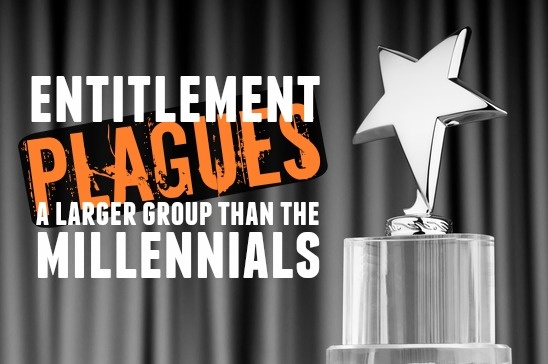When you think of the Millennial generation, I bet the word “entitled" comes to mind. Every time I ask a live audience about their thoughts of Millennials, “entitled” is always mentioned. But what if I told you there was a more entitled group among us than the Millennial generation?
Let’s first understand the origin of Millennial entitlement. I grew up playing competitive ice hockey in Colorado. One year we were fortunate enough to win the state championship, at which point, I expected to receive a trophy...a big one. But every other year, my fellow Millennial teammates and I never expected a trophy. But rather who were the "everyone gets a trophy" advocates?
The parents.
Entitlement is a learned behavior. Millennials never thought of themselves as entitled, but their parents on the other hand believed they were entitled to a trophy. Thus the birth of “helicopter parents.” A noble parenting style that infused different behaviors into an entire generation.
In my keynote presentations, I provide my audiences with a clear picture of who the Millennial generation is and how they got to be who they are. I also equip them with strategies to better lead, communicate, and market to Millennials.
One of the top questions I receive following my presentations is: "Why do I have to change for Millennials? Why don’t they have to change?”
In response, I reiterate a point from my presentation: "We shouldn’t change for the Millennials. We should change because technology and the Internet are rapidly evolving the way we work. Millennials are simply the signal and the catalyst for the exponential change that lies ahead. The exponential times that we now live in are demanding that we all change.”
The second response I’ll give is: “You don’t have to change, but just be prepared to handle the low employee engagement levels, the $20,000 Millennial churn price tag, the scarcity of fresh and innovative perspectives, and/or the lack of future leaders to carry the business forward.”
Related Read: 3 Proven Strategies To Strengthen Your Leadership Bench
What I find so ironic is the generation who enabled Millennial entitlement are the one’s blaming them for it. And more dangerously, by asking “Why do I have to change for Millennials?” signals to me that they have become entitled to their position. Entitled to their way of doing things. Entitled to an immunity to change.
We must begin to model the behavior that we wish others would adopt. Millennial's parents modeled entitlement and now it’s time to model the characteristics that will move our organizations forward. To stamp out entitlement in ourselves and in emerging generations we must practice servant leadership.
A servant leader prioritizes the needs of customers, employees, and communities first. The question shifts from “Why don’t they?” to “Why don’t I?" As famed author, Simon Sinek, put’s it, “Leaders eat last.” It’s up to leaders to expect more, to raise the lid of Millennial’s potential by modeling servant leadership so that they will be equipped to model it to Generation Z.
It’s the responsibility of mature leaders to find ways to connect (not necessarily correct) with those that follow them.
Related Read: The Inevitable Entrepreneurship Evolution, How Millennials And Generation Z Will Demand A New Kind Of Leadership
Those that are quick to label Millennials “entitled” should be cautious that they may be using that comment to shift blame and as an excuse not to change. And in today’s exponential changing times, that’s one slippery slope to irrelevance.
Question: Where else do you see entitlement in the workplace?
Consider Ryan to be your next keynote speaker by clicking here...
![]()






